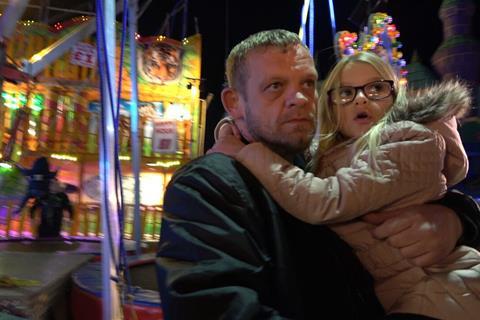Thursday, 20 September 2018
Hard-knock life: "A Northern Soul"
The British documentarist Sean McAllister first seized cinephile attention with 2015's A Syrian Love Story, which brought a sometimes distant-seeming conflict into sharp, stark, emotionally potent focus by following one relationship over several years. McAllister's follow-up A Northern Soul is a homecoming of sorts, returning the filmmaker to his native Hull at an interesting moment: early 2017, when the European City of Culture celebrations were first gearing up (McAllister served as artistic director for the spectacular opening ceremony), the diffuse cloud of Brexit was looming large (Hull voted 68-32 to leave the EU), and a half-decade of Tory austerity cuts were beginning to bite hard. Again, he finds the personal in the political (and vice versa) by tagging along in the wake of a friend: Steve Arnott, a fortysomething warehouse operative, young Mark E. Smith lookalike and rap enthusiast, whose contribution to the city's artistic beanfeast was to tour schools with the Beats Bus, a mobile recording van in which local children could lay down beats and rhymes of their own. While he does the rounds with that project, McAllister very precisely pins down the finer details of where Steve is in life: living with his mum after the collapse of his marriage, stuck with nine thousand pounds' worth of payday loan debts, a ninety-minute drive away from the daughter he dotes upon. Still, he soldiers on; he gives back. Only rarely does McAllister find him complaining about his lot - though it does seem a lot.
The film born of this careful, intimate portrait turns out to be two documentaries in one, and it's a testament to McAllister's editorial skill that he finds the right balance between them at any given point in Steve's progress. The more conventional of these two films - what we might call the poptimists' film - takes in the joy that follows whenever Steve sets foot inside a classroom and begins breaking the basics of rap down for the benefit of visibly enthused youngsters; his tutelage transforms the shy into camera-hogging, mike-dropping MCs, habitual stutterers into bolshy wordsmiths, troublemakers into artists. (A point is subtly made: here is the kind of elevating arts education our current administrators are quietly defunding and dropping from the curriculum.) There might well have been a straightforward commercial hit in that movie, yet McAllister also wants to show us something more: the hard graft of everything else in Steve Arnott's life. It's the 4:40am starts on cold winter days; the pressure that comes from trying to combine this volunteer work with a full-time paying gig; the stark reality of being forty years old and having no kind of job or life security whatsoever. Every now and again, the two films merge. In the aftermath of a public performance, we find one child in tears because his dad couldn't get time off work to see him. (Again, it's not dwelt on, but there may be something telling in the fact the kids are performing a post-Hamilton number about the city's links to slavery.)
McAllister's theme, it transpires, is men at the mercy of a system that permits very little other than work; he has returned to this City of Culture to illustrate just how hard it is nowadays for anyone to be cultured, creative, or more than a cog in a machine. The most damning development comes halfway through, when the employer that provided Steve with the Beats Bus hauls him in for a performance review that rules he's been spending too much time away from the workplace, and promptly removes him of his hard-earned bonuses; mulling this decision over a pint, Steve declares - with typical practicality, and some of the language that made the film's original certificate a bone of contention - "Fuck being a starving artist." At 70 minutes, it feels brief, especially when set against its epic-seeming predecessor (itself only 76 minutes; McAllister makes his points with admirable economy): I couldn't help but wonder how Steve voted (if he voted) back in May 2016, although we must concede not everything has to be about Brexit, and that such information may have altered viewer perceptions one way or another. (As it is, A Northern Soul sets itself up nicely for a sequel: where will this man, this community, this country be in two years' time?) There's a forceful honesty, however, to the way McAllister's camera keeps rolling after school, to witness Steve collapsing on his mother's sofa - partly from exhaustion, partly in despair - and wondering, as many have, why on earth he's bothering. Anyone fool enough to doubt the generosity or work ethic of the people of the North, look sharpish.
A Northern Soul is now showing in selected cinemas.
Subscribe to:
Post Comments (Atom)

No comments:
Post a Comment